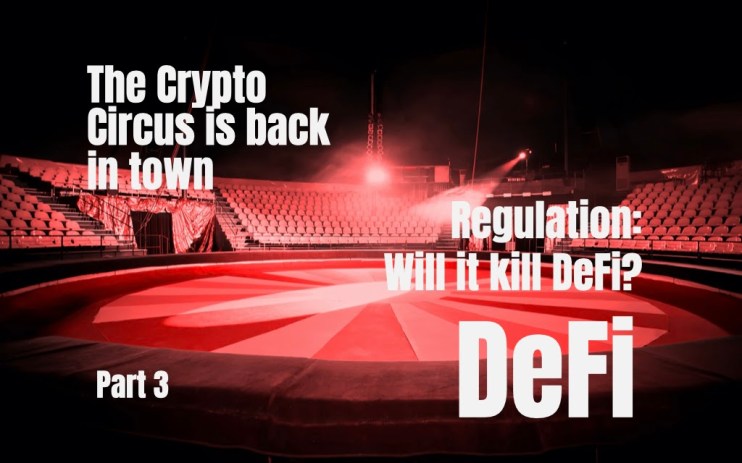The Crypto Circus: Has the DeFi Carnival Begun to Pack Up it’s Tents? (Part 3)

If there is one thing for sure, nothing in crypto moves slowly. Everything happens at breakneck speed: The booms AND the busts. DeFi is not an exception – It’s just another iteration that proves the point.
As of this article’s publication, there is some $8.26Bn worth of ETH locked up in various DeFi projects. And that’s up from $1.95Bn in Q2 2020. I always find it funny that people in both the media and the crypto community always express the size of their ‘crypto wealth’ in fiat currency like US Dollars.
I also find it funny (ridiculous) that there is some $8.26Bn worth of ETH that has just been ‘sitting around’ in people’s wallets. Up until the ‘era’ of DeFi, there was just no way to earn interest on the crypto or to otherwise “make it work” for you (unless you sold it for Fiat). The only way crypto was ever going to make money was when (or if) the value of ETH went up.
The same was true of the whole ICO boom. People had all of this crypto lying around and no way to spend it. There was nothing you could do with it. And in 2016/2017 there weren’t many exchanges where you could sell even if you wanted to. ICOs came along and they gave people a chance to finally “do” something with all that crypto they had accumulated.
In 2017 and 2018, one of the biggest questions for any project was: “Is your token a security or a utility?” If you could pass your project and token off as a utility, you could (arguably) avoid much of the regulation.
DeFi has many of the same characteristics as those old ICOs: Namely hype and crash potential.
With the passing of ICO’s people still had a bunch of crypto and did not know what to do with it. They were bored. DeFi gives people some pretty impressive games they can play where they can get new tokens and “grow their stack”.
However: The stack is still worthless as it has no intrinsic value in and of itself (The only ‘value’ being from a gamification and competitionional perspective)
DeFi has many of the same characteristics as ICOs. Namely hype and crash potential.
Similar to the “security or utility” discussion of ICOs, DeFi projects are presenting themselves as nothing more than games or innovation experiments. They actively avoid any wording which might make them fall into the “security” space and potentially become a target for regulation.
As the amount of ETH locked up in DeFi continues to grow, and more and more projects implode, the regulators are increasing their scrutiny, and rightly so. One wrong move from just one project and it could be the first domino for a global, multi-jurisdictional avalanche that will sweep DeFi into the dusty abyss wherein the husks and dead dreams ICO’s and the rest went to perish.
One of the biggest attractions of crypto is anonymity. DeFi actively embraces this under the heading of (pseudo) inclusivity. Anyone with a phone or a computer can be part of the DeFi community. The counter-argument to this is that DeFi operates in a regulatory grey (or outright black) market. With no Know Your Customer (KYC) or Anti-Money Laundering (AML) protections, DeFi is ripe for exploitation, much of it the same illegality darkening Ethereum Name Services.
When looking at DeFi products to engage for crypto lending, stable coins, yield farming or liquidity mining, you have got to use a crypto exchange. You can’t avoid it.
Many exchanges are traditional – centralised and subject to regulatory compliance. In DeFi there are decentralised exchanges (DEX) where the entire system runs as a series of smart contracts on Ethereum (or an equivalent blockchain)
However, if you look closely, you’ll find that most of these decentralised exchanges still have a very centralised control network with only a few individuals making the majority of the decisions related to the governance and operation of the exchange. Where there is control, there is risk: Potentially (and growing daily) jail-time risk.
Regulators around the world are watching in a mostly reactive approach. But DeFi is moving extremely quickly, and new products are coming (and going) at such a pace that it is difficult for the regulators to keep up. There are even questions as to which regulatory bodies should be regulating which DeFi products? Should central banks be regulating stable coins? What about securities regulators monitoring new tokens and tokenized assets? Who should be regulating the lending and borrowing of crypto assets?
I suppose that self-regulation is possible. I can only hope that DeFi does a better job of it than the promises made by AdTech.
As with many traditional industries, there is a commitment and a promise to act in the best interest of the public who are participating in the DeFi ecosystem (I cannot bring myself to call them investors because they aren’t: They’re just gamblers and gamers) Thus far it seems that the majority of the DeFi projects SEEM to have good intentions. My research also shows a level of self regulation to bad actors: When someone decides to “colour outside the lines”, the community is quick to step in and take action.
An example of that was the recent sell-off of $12.5M worth of ETH by the lead developer of the SushiSwap platform (Chef Nomi). After an extensive (and VERY public Tweetstorm) Chef Nomi surrendered the crypto keys to an independent third party to ensure that the Sushiswap platform users would not suffer any other horrific price drops.
I suppose that total self-regulation is possible. I can only hope that DeFi does a better job of it than the promises made by AdTech. It’s pretty clear that they only cared about revenue, holding both publishers and consumers in relatively low regard.
With a nearly 400% growth in TVL (Total Value Locked) since June, it doesn’t look like the DeFi circus has rolled up the majority of its tents just yet. However, punters and regulators are watching things very very closely. Many won’t make the same mistakes they made in the heady days of the ICO boom. Regulators won’t wait until people lose their retirement savings and their houses betting on sushi, pizza, curry or some other crazy game where you play with magical Internet money.
And you can bet your last worthless altcoin that someone out there will make an innocent mistake, an evil genius will exploit that, and the whole DeFi bubble will go “pop” overnight.It’s not a question of ‘if’, but rather ‘when’.
DeFi and crypto, in general, is just gambling. It’s NOT investing. It’s a game of musical chairs. And when the music stops, make sure you’re not the one who gets caught out – waking to find the tents gone, the attractions shuttered and your winnings only wooden chips wrapped in golden tinfoil.
Get in touch with us info@blockchainrookies.com / Twitter @igetblockchain

Troy Norcross, Co-Founder Blockchain Rookies
Twitter: @troy_norcross